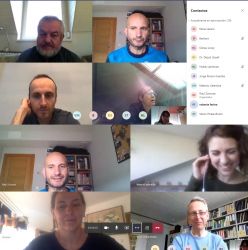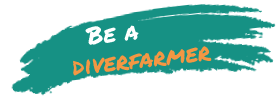The scientific committee of the project confirms control of the case studies and officially thanks the work of European farmers in the midst of the COVID-19 crisis
The European agricultural community is showing its fortitude in one of the most critical moments that the EU has had to face since it was founded. For that reason, the scientific committee of the Diverfarming project, in a virtual meeting today, has wanted to officially communicate its gratitude to the people in the agricultural sector who are maintaining a fundamental activity for the survival of the community’s economy.
The European agricultural sector is also upholding its commitment to sustainability and the environmental future of the planet by ensuring the continuity of the trials into the future of agriculture, based on crop diversification and on sustainable management practices, which are also still working.
 In this sense, as the scientific committee of the project has confirmed today, the 25 case studies still continue with the agricultural community in the supervision of the experimental lands in which the best combinations of crops are analysed so that, by the end of the project, all the necessary knowledge is available to enable agricultural communities to introduce these diversifications in their lands, gaining both in economic profits as well as in environmental sustainability.
In this sense, as the scientific committee of the project has confirmed today, the 25 case studies still continue with the agricultural community in the supervision of the experimental lands in which the best combinations of crops are analysed so that, by the end of the project, all the necessary knowledge is available to enable agricultural communities to introduce these diversifications in their lands, gaining both in economic profits as well as in environmental sustainability.
In matters of organising the work, the coordinators of each of the work packages have met by videoconference to update the status of the issues and trace the courses of action for the coming months. Dénes Lóczy and Jozsef Dezso from the University of Pécs (Hungary), Raúl Zornoza from the University of Cartagena, Elena Lázaro from the University of Cordoba, Heikki Lehtonen from the Luke Research Institute in Finland, Roberta Farina from the Italian research centre CREA, Jorge Álvaro from the CSIC, Barbara Pancino from the University of Tuscia (Italy), Valentina Materia from the University of Wageningen (Netherlands) and Sören Thiele-Bruhn from the University of Trier (Germany) have held a coordination meeting in which they have demonstrated how European scientific collaboration still works and is more necessary that ever.
This thus shows, once again, the backbone character of this type of project promoted by the European Commission; seeking in this case to foster the sustainability of the agricultural sector and to conserve the environment of the whole of the European Union, which is strengthened by such synergies.
Following the current recommendations of social distancing, meetings with farmers who are working on the creation of the ‘Diverfarming farmers communities’ have been postponed, which will lead to a delay in obtaining some of the results in the social aspects of the project, until the current situation is reverted.
Diverfarming is a project financed by the Horizon 2020 Programme of the European Commission, within the challenge of “Food Security, Sustainable Agriculture and Forestry, Marine, Maritime and Inland Water Research and the Bioeconomy”, which counts on the participation of the Universities of Cartagena and Córdoba (Spain), Tuscia (Italy), Exeter and Portsmouth (United Kingdom), Wageningen (Netherlands), Trier (Germany), Pecs (Hungary) and ETH Zurich (Switzerland), the research centres Consiglio per la ricerca in agricoltura e l'analisi dell'economia agraria (Italy), the Consejo Superior de Investigaciones Científicas (Spain) and the Natural Resources Institute LUKE (Finland), the agrarian organisation ASAJA, and the companies Casalasco and Barilla (Italy), Arento, LogísticaDFM and Industrias David (Spain), Nieuw Bromo Van Tilburg and Ekoboerdeij de Lingehof (Netherlands), Weingut Dr. Frey (Germany), Nedel-Market KFT and Gere (Hungary) and Paavolan Kotijuustola and Polven Juustola (Finland).










